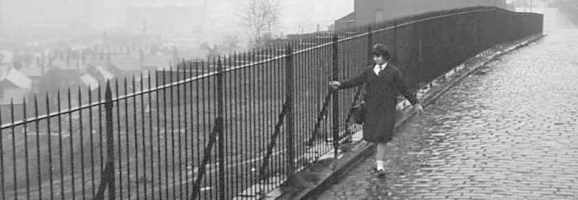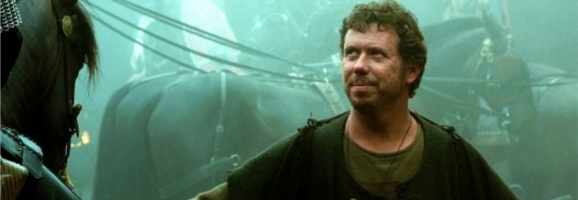This is England? The Working Class in British Cinema from A Taste of Honey to The Selfish Giant

In the United Kingdom of 2013 we are told that we are living in austere times but it’s just a temporary thing right? That games console your son wants for his birthday? Your daughter’s dancing lessons – ‘cos she’s going to be a star one day right? Well pay your bills, put a little aside each week and you’ll get there. There is always a brighter tomorrow if we keep our noses clean and to the grindstone. In the fifty-plus years since Shelagh Delaney declared that she wrote A Taste of Honey because she wanted to ‘address social issues that she felt were not being presented’, how much has really changed?
If we look for an answer to the tradition of great British movie making in the genre of ‘gritty’ working class films, from Delaney’s seminal tale of class, race, gender and sexual orientation to Paddy Considine’s no-frills Tyrannosaur or Clio Barnard’s critically acclaimed reworking of the Oscar Wilde story The Selfish Giant, we may wonder what is so different now. But who cares? These are just great films right? We can indulge our sense of righteous injustice and revenge-lust as we cheer on Shane Meadow’s calculating killer Richard as he stalks his pray across the bleak estate-scapes of Derbyshire in Dead Man’s Shoes, or marvel at the cinematic skills of Ken Loach as he captures perfectly a Barnsley boy’s schooldays in his masterpiece, Kes. But just as Loach may be accused of losing his edge with the decidedly toothless Angel’s Share – ‘The best British movie since the last one!’ – so do we demand authenticity.

If we’re serious about films, living as we do in an era of university degrees offering vocational courses in screenwriting, filmmaking and film production, then we must acknowledge that the integrity of our art is paramount, and if it’s going to be made in England, well what have you got? Do you really want to see a trouserless Colin Firth shimmying along a window ledge in the lazy remake of Gambit, or will it be the heart-rending inability of Tom Courtenay’s Billy to break free in John Schlesinger’s peerless Billy Liar that inspires? If Saturday Night and Sunday Morning, written by the great Alan Sillitoe is just a film; if Andrea Dunbar’s majestic Rita, Sue and Bob Too is just a film, then The Satanic Verses is just a book, Blasted is just a play.
British cinema since the 1950’s has provided untold inspiration for the would-be filmmaker but it may also be viewed as a rich source of social and cultural history. The ‘kitchen sink’ dramas of Shelagh Delaney’s era were borne out of the groundbreaking socially realistic theatre of John Osborne, Harold Pinter and Delaney herself, who adapted the screenplay for a Taste of Honey from her own play and located her characters in the bleak Manchester satellite town of Salford; Delaney and director Tony Richardson thus creating the template for the backdrop of many of the classic films that were to follow. As post-war Britain drew lines that would delineate not only class and status in the bright new world of consumer culture, the geography of the country itself was redefined and an influential lineage of filmmakers, playwrights and writers emerged from the industrial towns of the North.

Of course the working classes of Britain are not just confined to the North of England but somehow, in the world of cinema, between life and art where something is lost, something is gained, this often seems to be the case. There is indeed ‘a tradition’ of films that define ‘working-class culture’ and in which, perhaps, we define ourselves and others according to the paradigms of the genre. But with the odd exception, the curve ball of Chris Morris’s Four Lions for example, where is the British movie of the Asian, the Afro-Caribbean and the Eastern European? Is it that as much as we may claim to celebrate cultural diversity, inclusion and equality, we are still a country divided? Or are we a country divided and ruled?
Has there indeed been a return to the ‘Victorian values’ of Margaret Thatcher’s capitalist dream? Consider the obsequious, apprenticeship-chasing wannabe, willingly ridiculed and abused by the great industrialist espousing ‘hard graft’ as he inspires treachery and betrayal. How about the worthy, cap-doffing recipient of a few thousand pounds from the ‘philanthropic’ benefactor’s ‘secret’ millions as he condescends to ‘give a bit back’? Such is the fare of British ‘reality television’ all in the name of entertainment, and if we’re talking about reality in British movies: Angel’s Share anyone? Or perhaps things have never changed that much? How dissimilar to the unpaid internships of Charles Dickens’ era are the ‘work placements’ of today? Of course the would-be filmmakers amongst us would jump at the chance to work for our cinematic role models, for nothing if necessary, but just how long is that bright tomorrow in coming?
And so, As Mike Leigh grows old gracefully with Another Year, Ruth Sheen and Jim Broadbent as Tom and Gerri Hepple look out from their allotment-in-the-rain shelter across a past in which they worked hard and made it; a past in which others were not so lucky and the slightly tweaked characters of Lesley Manville’s wounded Mary and David Bradley’s lost-at-sea Ronnie find their own kind of shelter at the Hepple’s table. But what of the future – Paddy Considine and Shane Meadows may be the heirs to Leigh and Loach’s crown but what of Andrea Arnold and Clio Barnard? Meadows’ England is not of course the only England and although Considine suggests in Tyrannosaur a moral life after the death of a Christian England, it is perhaps Barnard’s revision of Wilde’s tale in which the promise of a an afterlife is supplanted by the intimation that we must look to ourselves for redemption and love in a new England, a new Britain, of community, equality and peace.
What do you think? Leave a comment.










Mind me geeking out on Dead Man’s Shoes. It is one of the greatest, darkest, British films I have ever seen. I have read many threads discussing the movie bemoaning that it didn’t really have “real” gangsters in it and that it didn’t work as a comedy nor did it provide pornographic violence. What this film does provide is stunning acting and a twisted dark and realistic portrayal of distorted lives. The victims although guilty are human and real and the vengeful brother, full of righteous invincible anger, is also a man on the edge unable to draw back from his path.
Beautifully and eloquently put! I completely agree. I worked closely with Seamus O’Neill some years before he played Big Al in the film and I felt dead chuffed that I knew someone in it!
Thanks for reading.
Ged
Seeing as I am a firm believer (or is it that I just refuse to deny?) that film is inextricably tied to its politics it is refreshing to see this kind of article Ged. There seems to be a gulf between the kinds of British films that do well, particularly overseas (i.e. The King’s Speech) and the kinds that deal explicitly with class and/or class conflict. It is the latter group of films which is more vital, important and ultimately, truthful in depicting and engaging with the realities of this country. Though films like The Kings Speech, and our responses to them, are telling also.
Thanks Sam, spot on – I couldn’t agree more. I look forward to reading some of your own work!
Thanks for reading.
Ged
Really thoughtful stuff – isn’t it funny that it is the more privileged nations in the world that specialise in ‘gritty cinema’ (thinking in particular here of Britain and Scandinavia), whereas nations with really massive class gaps tend to create happily-ever-after rom-coms and escapist action thrillers? Catharsis at work, perhaps?
Thanks for your comment Sarah. Countries can be like people can’t they? They just want you to see the best in them and think that everything is tickety-boo and the next thing – there’s a riot!
Although I knew nothing about the Danish royal family and less about Denmark’s history I enjoyed A Royal Affair which suggested the beginnings of a very democratic society – and then there’s a riot! And then five years later the same thing in Sweden!
Catharsis indeed!
Interesting post worth sharing, so I did. Thanks!
No, thank you!
Really insightful article! I’ve only recently had my eyes opened to British cinema but there’s so much and its so good. There definitely needs to be more written about British cinema from 40s wartime to present although this articles got a lot of films and directors I’ll be checking out. Also here’s a bit of trivia I heard that Billy Liar has the first on screen toilet being flushed in cinema, take that Hollywood!
Thank You Niamh. I didn’t know that about the flushing toilet – as ever the British set the precedent!
this is great Ged
as a reluctant pessimist i have to make the observation that the dividing and ruling has only really reached a fairly low plateau, and the er austerity measures of the queen’s government are only just beginning to wreak the havoc/fear/violence/paranoia/misery that appeared to be the only possible outcome of such deliberate and calculated actions.
Maybe Meadows will make a revolutionary film where another Richard spikes a load of grotesque politicians/property developers/royal family members and slaughters them.(i must agree with Stu that dead man’s shoes is an astounding film.- It only gives it to the small- minded bigots and smart-arses who keep britain great though– as thats the context of the film)
peace and love
Dave
apologies for the semi-ranting half-baked comment above…I believe I was drunk, and therefore should not have been anywhere near a computer keyboard
peace and love still though
Dave
No apology necessary. In his review of Michael Shelden’s official biography of George Orwell, the writer John Mortimer said this:
‘A highly readable and finally moving account of a man who looked at his world…and wrote down exactly what he saw…He may have tilted at windmills, but some of them were real dragons. It is good for us to read about him in a Britain which has got out of the habit of tilting at anything very much at all’
Keep tilting my friend.
What a great article. In my opinion British cinema captures a reality unlike anything anywhere else in the world can offer.
Thank you Jonny. British cinema, like British nusic has always indicated which way the wind is blowing in the Western World.
Great piece. Wonderfully written and argued with force and clarity.
Thanks Jon.
Ged Crefin, you are a true genius X.